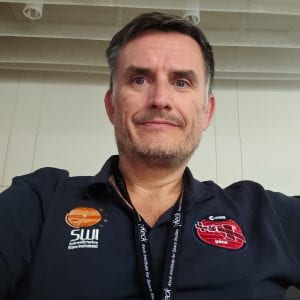“Reevaluating Galilean Moon Formation Models in the Context of ESA/JUICE and NASA/Europa Clipper Missions“
Joint Astronomy and Astrobiology talk
Speaker: Prof. Olivier Mousis, Aix-Marseille Université, CNRS, CNES, Institut Origines, LAM, Marseille, France.
Date: Wednesday, March 6, 2024
Time: 10:30am – 12:00pm
Location: Nat Sci Annex 101 & Zoom (link)
The thorough exploration of the Jovian system is currently underway and is set to continue into the next decade. NASA’s Juno mission, initiated in 2016, has been diligently studying Jupiter’s atmosphere, magnetosphere, and interior environment. In its extended mission phase, Juno is actively conducting multiple flybys of the moons Ganymede, Europa, and Io, providing valuable insights into their charged particle and radiation environments. Simultaneously, ESA’s JUICE (JUpiter ICy moons Explorer), launched in April 2023, and NASA’s Europa Clipper mission, scheduled for launch in October 2024, are poised to significantly advance our understanding of the Galilean moons—Callisto, Ganymede, and Europa. These missions are meticulously designed to gather an unparalleled volume of data on the chemical and isotopic compositions of the surfaces and exospheres of these moons. This influx of data promises a significant leap forward in deciphering the formation conditions of the Galilean moons. To achieve this, it is imperative to accurately interpret the gathered data in the context of the physical and chemical processes that transpired during the evolution of these celestial bodies. The seminar’s primary objective is to explore the intricate connections between the current isotopic and chemical composition of the volatile phase observed on the surfaces and exospheres of the Galilean moons and their formation conditions within the Jovian circumplanetary disk (CPD). Furthermore, the discussion will extend to post-formation processes that have influenced the evolution of these moons. These processes encompass the chemical evolution of interior oceans, the exchange of interior material with the ice shells and exospheres, and the interplay between the exospheres and the Jovian magnetosphere. By tracing the origin and fate of volatiles, this seminar aims to provide insights into the generic evolutionary processes of the Jovian system, with implications for understanding similar phenomena in other planetary systems.
About the speaker:
 Prof. Olivier Mousis’ research focusses on the investigation of the formation conditions of planetary systems, with a special emphasis on our solar system. His goal is to establish a link between the present chemical/physical properties of planetary bodies and those associated with the many processes leading to their formation and primo-evolution in protoplanetary disks via the use data obtained from spacecrafts, ground-based facilities and laboratory experiments. He is also involved in the concept and preparation of robotic missions dedicated to the exploration of the outer solar system. He has been leading a long-term effort to define future space missions that will deliver atmospheric entry probes to the four giants, with a special emphasis first on Saturn (he has been the pI of the HERA mission proposal submitted to ESA in response to the M4 and M5 calls) and more recently on the Ice Giants Uranus and Neptune. Prof. Mousis has recently been the principal investigator of an international consortium aiming at proposing an Enceladus exploration mission to the 2022 ESA M-class call (Moonraker mission).
Prof. Olivier Mousis’ research focusses on the investigation of the formation conditions of planetary systems, with a special emphasis on our solar system. His goal is to establish a link between the present chemical/physical properties of planetary bodies and those associated with the many processes leading to their formation and primo-evolution in protoplanetary disks via the use data obtained from spacecrafts, ground-based facilities and laboratory experiments. He is also involved in the concept and preparation of robotic missions dedicated to the exploration of the outer solar system. He has been leading a long-term effort to define future space missions that will deliver atmospheric entry probes to the four giants, with a special emphasis first on Saturn (he has been the pI of the HERA mission proposal submitted to ESA in response to the M4 and M5 calls) and more recently on the Ice Giants Uranus and Neptune. Prof. Mousis has recently been the principal investigator of an international consortium aiming at proposing an Enceladus exploration mission to the 2022 ESA M-class call (Moonraker mission).
Prof. Mousis is a laureate of a Fundamental Chair attributed in 2022 by the Institut Universitaire de France and a Senior Chair of Excellence awarded in 2015 by Aix-Marseille Université. He is also the PI of the FACOM (FAte of the volatile COmpounds at the galilean Moons) consortium funded by the French National Research Agency over the 2022-2025 period.
Prof. Mousis has authored/co-authored over 250 research papers, and delivered 550+ oral and written contributions to international conferences. Hindex = 64 and 13700+ citations (source Google Scholar, January 2024).
He is the Director of the Origins institute at Aix-Marseille University.
Recording of the talk:
